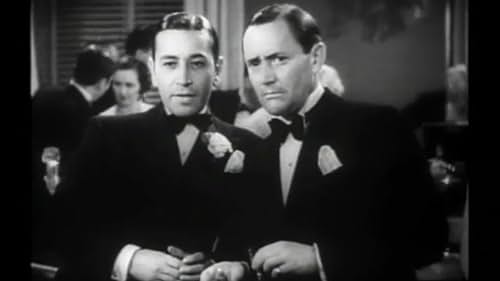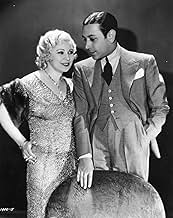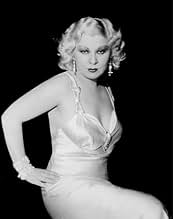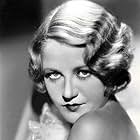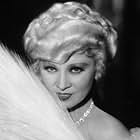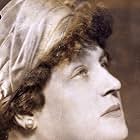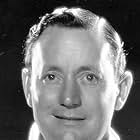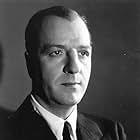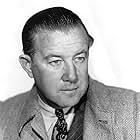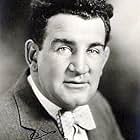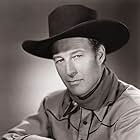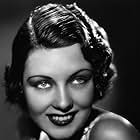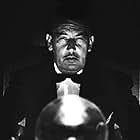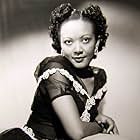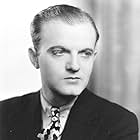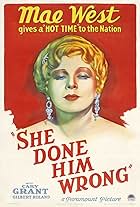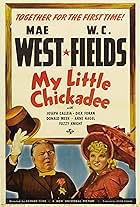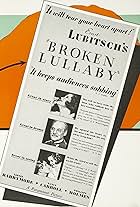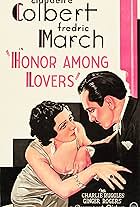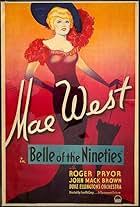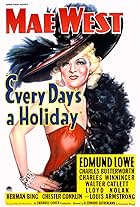IMDb RATING
6.7/10
1.1K
YOUR RATING
A successful ex-boxer opens a high-class speakeasy in what once was the childhood home of a formerly rich society girl.A successful ex-boxer opens a high-class speakeasy in what once was the childhood home of a formerly rich society girl.A successful ex-boxer opens a high-class speakeasy in what once was the childhood home of a formerly rich society girl.
George Templeton
- Patsy
- (as Dink Templeton)
Bill Elliott
- Escort
- (uncredited)
Patricia Farley
- Hatcheck Girl
- (uncredited)
Dick Gordon
- Nightclub Patron
- (uncredited)
Theresa Harris
- Ladies' Room Attendant
- (uncredited)
Anderson Lawler
- Lonely Drunk
- (uncredited)
Storyline
Did you know
- TriviaIn the famous scene in which the hat-check girl exclaims over Maudie's (Mae West) jewels, "Goodness, what beautiful diamonds," and Maudie replies, "Goodness had nothing to do with it, Dearie" the diamonds Mae West was wearing were real, and her own.
- GoofsA shadow of the boom microphone moves across a column to the right after Leo keeps Iris from running after Joe as he is taking Jerry out of the speakeasy to get a cab.
- Quotes
Hatcheck girl: Goodness, what beautiful diamonds!
Maudie: Goodness had nothing to do with it, dearie.
- ConnectionsFeatured in Hollywood: The Gift of Laughter (1982)
- SoundtracksEveryone Says I Love You
(uncredited)
Music by Bert Kalmar
Played at the speakeasy when Joe makes the rounds and first spots Jerry
Also played at the end
Featured review
NIGHT AFTER NIGHT (Paramount, 1932), directed by Archie Mayo, from the play "Single Night" by Louis Bromfield, is a little remembered feature known solely for its movie debut of the legendary Mae West (1892-1980). Although NIGHT AFTER NIGHT focuses mainly on its leading players, George Raft and Constance Cummings, and a little more footage to Roscoe Karns and Alison Skipworth, this average story, set almost entirely in one night at a speakeasy, about a mug owning a nightery wanting to elevate himself into the upper class of high society, actually is more interesting when Mae West dominates the scene.
NIGHT AFTER NIGHT begins with the opening titles super imposed in front of a mansion with the underscoring to "There's No Place Like Home." With the credits still rolling, a brief history about the mansion is told, first seen with a "for sale" sign, followed by a sign reading "home for rent," and finally the last look of another sign "sold at public auction," before the list of cast credits is focuses fading out with the number of the house address of "55." George Raft plays Joe Anton, a former boxer now the proprietor of a mansion converted into a New York City speakeasy (as pictured during the opening credits) who wants to become part of the social class. Because he has become interested in a mysterious but glamorous woman (Constance Cummings) who patrons his place unescorted night after night, he hires Mrs. Mabel Jellyman (Alison Skipworth), a middle- aged schoolteacher, to teach him the proper methods in speaking and the refinements of life. Eventually Joe becomes acquainted with the woman identified as Jerry Healy of Park Avenue who patronizes his place mainly because the speakeasy happens to be the mansion she had lived in years ago. Because of Anton's involvement with "Miss Park Avenue," Iris Dawn (Wynne Gibson), one of his former mistresses becomes insanely jealous, enough to want to confront Joe and Miss Healy with a loaded pistol. Joe, however, gets even more complications when another one of his old flames, Maudie Triplett (Mae West), enters the scene with her vulgarity and broad humor, rousing up his place.
The supporting cast consists of Roscoe Karns as Leo, Joe's close friend and assistant; Louis Calhern as Dick Bolton, appearing only in one scene opposite Cummings; Al Hill as Blainley; Harry Wallace as Jerky; and Tom Kennedy as Tom, the bartender, among others.
Sadly, NIGHT AFTER NIGHT is a long forgotten and often neglected little movie from the Depression era. Best known for playing gangsters, for his initial starring role, Raft's character is only associated with them, particularly gang leader, Frankie Guard (Bradley Page) who wants to buy Joe's establishment.
The story-line is slight, in fact, enough to stretch it to the 70 minute mark, with few of those minutes going to the fourth billed Mae West as Maudie. West fans would have to sit through more than a half hour devoted to other actors before making her classic entrance, first outside the speakeasy surrounded by men, followed by her walk to the coat check room where the attendant looks over her jewelry and says, "Goodness! what beautiful diamonds." West: "Goodness had nothing to do with it, dearie." With this line, and some others that were to follow, written especially by Mae West herself, a new star is born.
Essentially, this is a light drama with a touch of comedy, compliments of the wit and wisdom of Mae West, NIGHT AFTER NIGHT is one of those rare cases where two tough babes become essential in the story instead of the standard one, but it is West who's character is the most original and natural of the two. While debut films of future major stars are seldom promising, with this one being no exception, NIGHT AFTER NIGHT has become the one and only movie in which West would play a supporting role. Unlike latter West comedies, NIGHT AFTER NIGHT does not take time out for a song or two, but the use of popular tunes of the day, many introduced in other Paramount 1932 productions, including "Everyone Says I Love You," "Mimi," "Isn't It Romantic," "You Little So and So," and "Love Me Tonight" as underscoring during the nightclub sequences.
Although it was Raft who reportedly encouraged West to accept this minor supporting role, he probably never imagined that she's steal the show. In spite of NIGHT AFTER NIGHT being the film that launched George Raft career as a leading man, basically established Mae West into a box office attraction. For Raft, maybe she done him wrong.
Another unfortunate thing about NIGHT AFTER NIGHT is that because it essentially belongs to Raft and Cummings, it hardly ever became part of commercial television's Mae West festival back in the 1960s and 70s. In fact, this was and still is the least known and revived of her movies, even when given a rare cable television broadcast on Turner Classic Movies (TCM premiere: August 24, 2016). Prior to that, MCA Home Video distributed NIGHT AFTER NIGHT as part of the Mae West centennial package in 1992, releasing all her Paramount movies of the 1930s, including the neglected NIGHT AFTER NIGHT. The legend of Mae West has dimmed some over the years, but once watching any of her movies, even the one that offers little of her presence as NIGHT AFTER NIGHT, it would become apparent that she was something special. Goodness probably had nothing to do with it, but talent and her dialog delivery sure does. (***)
NIGHT AFTER NIGHT begins with the opening titles super imposed in front of a mansion with the underscoring to "There's No Place Like Home." With the credits still rolling, a brief history about the mansion is told, first seen with a "for sale" sign, followed by a sign reading "home for rent," and finally the last look of another sign "sold at public auction," before the list of cast credits is focuses fading out with the number of the house address of "55." George Raft plays Joe Anton, a former boxer now the proprietor of a mansion converted into a New York City speakeasy (as pictured during the opening credits) who wants to become part of the social class. Because he has become interested in a mysterious but glamorous woman (Constance Cummings) who patrons his place unescorted night after night, he hires Mrs. Mabel Jellyman (Alison Skipworth), a middle- aged schoolteacher, to teach him the proper methods in speaking and the refinements of life. Eventually Joe becomes acquainted with the woman identified as Jerry Healy of Park Avenue who patronizes his place mainly because the speakeasy happens to be the mansion she had lived in years ago. Because of Anton's involvement with "Miss Park Avenue," Iris Dawn (Wynne Gibson), one of his former mistresses becomes insanely jealous, enough to want to confront Joe and Miss Healy with a loaded pistol. Joe, however, gets even more complications when another one of his old flames, Maudie Triplett (Mae West), enters the scene with her vulgarity and broad humor, rousing up his place.
The supporting cast consists of Roscoe Karns as Leo, Joe's close friend and assistant; Louis Calhern as Dick Bolton, appearing only in one scene opposite Cummings; Al Hill as Blainley; Harry Wallace as Jerky; and Tom Kennedy as Tom, the bartender, among others.
Sadly, NIGHT AFTER NIGHT is a long forgotten and often neglected little movie from the Depression era. Best known for playing gangsters, for his initial starring role, Raft's character is only associated with them, particularly gang leader, Frankie Guard (Bradley Page) who wants to buy Joe's establishment.
The story-line is slight, in fact, enough to stretch it to the 70 minute mark, with few of those minutes going to the fourth billed Mae West as Maudie. West fans would have to sit through more than a half hour devoted to other actors before making her classic entrance, first outside the speakeasy surrounded by men, followed by her walk to the coat check room where the attendant looks over her jewelry and says, "Goodness! what beautiful diamonds." West: "Goodness had nothing to do with it, dearie." With this line, and some others that were to follow, written especially by Mae West herself, a new star is born.
Essentially, this is a light drama with a touch of comedy, compliments of the wit and wisdom of Mae West, NIGHT AFTER NIGHT is one of those rare cases where two tough babes become essential in the story instead of the standard one, but it is West who's character is the most original and natural of the two. While debut films of future major stars are seldom promising, with this one being no exception, NIGHT AFTER NIGHT has become the one and only movie in which West would play a supporting role. Unlike latter West comedies, NIGHT AFTER NIGHT does not take time out for a song or two, but the use of popular tunes of the day, many introduced in other Paramount 1932 productions, including "Everyone Says I Love You," "Mimi," "Isn't It Romantic," "You Little So and So," and "Love Me Tonight" as underscoring during the nightclub sequences.
Although it was Raft who reportedly encouraged West to accept this minor supporting role, he probably never imagined that she's steal the show. In spite of NIGHT AFTER NIGHT being the film that launched George Raft career as a leading man, basically established Mae West into a box office attraction. For Raft, maybe she done him wrong.
Another unfortunate thing about NIGHT AFTER NIGHT is that because it essentially belongs to Raft and Cummings, it hardly ever became part of commercial television's Mae West festival back in the 1960s and 70s. In fact, this was and still is the least known and revived of her movies, even when given a rare cable television broadcast on Turner Classic Movies (TCM premiere: August 24, 2016). Prior to that, MCA Home Video distributed NIGHT AFTER NIGHT as part of the Mae West centennial package in 1992, releasing all her Paramount movies of the 1930s, including the neglected NIGHT AFTER NIGHT. The legend of Mae West has dimmed some over the years, but once watching any of her movies, even the one that offers little of her presence as NIGHT AFTER NIGHT, it would become apparent that she was something special. Goodness probably had nothing to do with it, but talent and her dialog delivery sure does. (***)
- How long is Night After Night?Powered by Alexa
Details
- Runtime1 hour 13 minutes
- Color
- Aspect ratio
- 1.37 : 1
Contribute to this page
Suggest an edit or add missing content


